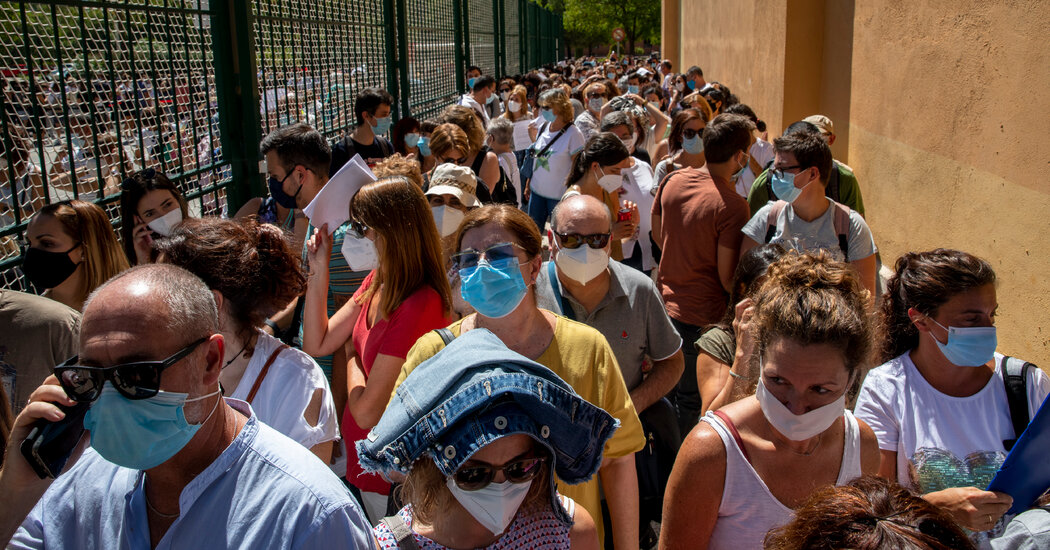MADRID — Soccer, beaches, bullfights and discos. Spain’s priorities for reopening its economy after months of confinement read like a declaration of the government’s vision for the country. Just days before the school year begins, our politicians have finally decided to tackle what they seem to consider least urgent: the education of millions of students.
The lack of foresight that has generated confusion about the reopening of schools is part of a process burdened by opacity, a lack of reliable data, inconsistency and slow reactions on the part of the central and regional governments. Behind us are wasted months of unheeded warnings and failed planning. And so, after suffering one of the worst first waves of coronavirus infections, Spain now faces the worst resurgence in Europe.
The start of the school year, scheduled in some parts of the country for Sept. 4, will take place amid the chaos of a student strike, different strategies in each region and improvised plans to hastily reduce the student-to-teacher ratio, reorganize schedules, hire teachers and put measures in place that should have been planned months in advance, as they were in other countries. What would have been surprising is if those same authorities who left the educational system to flounder decades ago had done their homework on time.
The understandable decision to try to reopen the country as soon as possible to salvage the peak tourism season — “We came out stronger,” read the government slogan — has been handled with carelessness and irresponsibility. Nightclubs and bars remained open for weeks after they were identified as a source of contagion, crowds were authorized for celebrations of all kinds, and the message was conveyed that the battle had been won, complete with applause for Prime Minister Pedro Sánchez.
While the national government became complacent, the autonomous regions that form Spain were tasked with organizing the kinds of systems for tracking and monitoring infections that have slowed the spread elsewhere. Most of them failed. The result is a reflection of Spain’s recent history: political parties and citizens fighting over whether the right or the left is to blame for a collective failure led by the least prepared politicians since the transition to democracy in the 1970s.
Accordingly, Spain has failed to comply with the requirements set forth by the World Health Organization and experts at the Harvard Global Health Institute for a safe opening of schools, including maintaining an infection rate of fewer than 25 cases per 100,000 inhabitants. (The incidence rate is up to 30 times higher in some of the most affected districts of Madrid.) The danger is that students will receive a second year of mediocre and incomplete education.
The political parties have been unable to agree on education legislation in over four decades. Parents, teachers and students justifiably despair at the changes each new administration brings, none of them confronting the real problems. For years, more energy has been wasted discussing whether religion classes should count toward grades — they should just let the parents choose — than in getting students to master English, understand a literary text or acquire basic scientific knowledge.
Spain has the worst youth dropout rate in the European Union, and the Organization for Economic Cooperation and Development’s PISA report on academic excellence in the sciences shows Spanish students scoring below the average. Those who go on to higher education enroll in universities that with few exceptions are disconnected from the job market and mired in bureaucratic paralysis with little regard for innovation. No Spanish university ranks among the world’s top 150, according to Shanghai Ranking.
The generations that will have to pull the country out of a new crisis are entering the work force without the tools to compete in a globalized world. Our future is jeopardized: Economic hardship is now heaped on top of our health care woes, placing Spain among the worst prospects for economic recovery among developed countries.
Our dependence on tourism and services has meant that for several months a year, half of all available jobs came from the hospitality industry. The closure of bars, restaurants and hotels has exposed the fragility of this model and condemns another generation to precariousness and a lack of opportunities. Our economy and education system need a coordinated revamp to help brake the perverse cycle that makes crises in Spain longer and more painful.
The Great Recession in 2008 could have been parlayed into a profound education reform focused on innovation, entrepreneurship and training. Instead, Spain chose to cut back on education spending and avoid any major reforms, keeping teachers in precarious employment. If history is any indication, we’re on track to repeat the same mistake.
The transformative power of education has been a driving force in China, South Korea, Taiwan and Singapore in recent decades. But we don’t need to look to Asian countries alone: Portugal, our Iberian neighbor, began major education reforms in 2000 that have turned its education scores around and brought its students up to par with the best in Europe, thanks to quality public schools.
Spain needs a Portuguese-style education revolution, starting with the training, assessment and fair remuneration of the people we entrust with the task of teaching our children. Beyond resources, the modernization of schools and universities will require a complete curriculum overhaul and reformulation of teaching and learning methods. We must urgently prioritize critical thinking, creativity, rational debate, civility and the humanities.
But it’s not the politicians, nor this journalist, who should design the schools of the future — it’s the experts who for years have put forth proposals and cautioned against a deterioration that will be reversed only when our society changes its priorities. The philosopher José Antonio Marina, who has been clamoring for change for decades, rightly laments, “Education is of no interest to anyone except parents with school-aged children.”
Until those priorities change on a societal level, they won’t change for our politicians either. Although the coronavirus pandemic has exposed one of our worst weaknesses as a nation, we will continue to be the country where education will never get a leg up on good fun.
David Jiménez (@DavidJimenezTW) is a writer and journalist. His most recent book is “El director.”
The Times is committed to publishing a diversity of letters to the editor. We’d like to hear what you think about this or any of our articles. Here are some tips. And here’s our email: [email protected].
Follow The New York Times Opinion section on Facebook, Twitter (@NYTopinion) and Instagram.



















